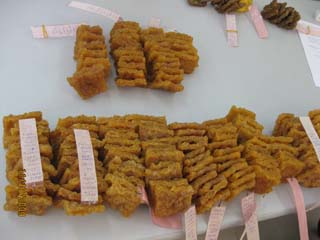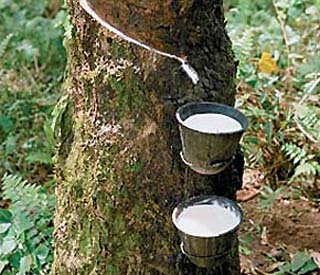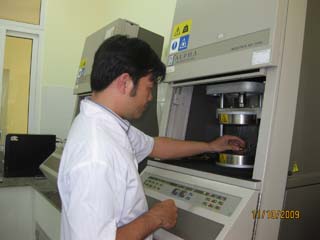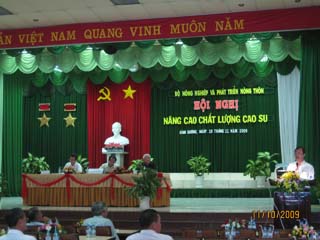Web Links
Rubber quality: decisive factor for competitiveness in rubber sector Posted Date: 08/12/2009
Finding effective solutions to enhance the quality of rubber products is one of the most important questions that rubber sector need to focus on, ensuring the position of Vietnam rubber at home and in abroad. This is also the main goal of the seminar held by the Ministry of Agriculture and Rural Development in early November for the localities suiting for rubber tree development. HTML clipboard
 |
|
|
Semi-processed rubber products at testing chamber |
|
The Ministry of Agriculture and Rural Development
reported that Vietnam rubber output has been increasing in recent 5 years.
Particularly, the rubber output in 2004 was 419,000 tonnes and in 2008, it
reached nearly 663,000 tonnes, and Vietnam was the world's fifth-largest
rubber producer and the fourth-largest rubber exporter. The natural rubber
export in 2008 was US$1,6 billion including SVR 3L (45.89%), SVR 10 (15-16%) and
SVR CV50, SCR CV60. However, the rubber quality which is a decisive factor to
ensure the competitiveness in current situation is still limited.
According to the Department of processing, trade
in agro-forestry- aquiculture and salt, Vietnam rubber export has to face the
fact that the quality latex is not ensured. Moreover, Vietnam rubber sector did
not have synchronous quality control system, thus Vietnam has a large amount of
rubber for export but mainly of natural rubber (SVR accounting over 44%).
Vietnam rubber has so far been considered inferior to the rubber of other
countries when being exported to American and European countries.
 |
|
|
Natural rubber latex |
|
According to Tran Thi Thuy Hoa,
General Secretary of Vietnam Rubber Association, the rubber prices in Thailand,
Malaysia or Indonesia are often from 5-7% higher than those of the same kind in
Vietnam.
China now accounts more than 60
percent of Vietnam's rubber export due to the fact that the China’s rubber
market did not have a lot of requirements for the quality standard. Meanwhile,
Mrs. Hoa added, such countries as America, Japan, German, Franch, and Rusia, etc
are rather selective about the rubber quality. In the upcoming time, Vietnam
rubber is considered to face much more difficulties when China plans to control
the quality of imported rubber. Vietnam plans to boost its natural rubber
output, so it is very urgent to enhance the rubber quality.
 |
|
|
Quality control system
of Dau Tieng Rubber Corporation |
|
At the seminar, most delegates said that
Vietnam rubber quality was not good due to the unsecured output, especially from
small rubber plantation areas. As for the rubber processing phrase in factories,
the production technology had not been invested reasonably enough, not meeting
the demands of the quality of rubber output. Moreover, the quality control
system was still weak. There are 132 rubber processing establishments in the
whole country, but just 10 testing chambers reaching the standard. Mr Lai Van
Lam, Head of Rubber Research Institute, stated “the fact leaders of enterprises
not approving to enhance the rubber quality limited the investment in production
technology for factories”.
 |
|
|
The seminar on enhancing
the rubber quality chaired by the Ministry of Agriculture and Rural
Development in Binh Duong province |
|
Therefore, Deputy
Minister Ho Xuan Hung emphasized that it was necessary to set up the rubber
processing standards, to build rubber processing plants and to improve the
quality control system as well as to closely monitor the rubber output to the
world market. He also affirmed that “Enterprises themselves should actively
enhance the rubber processing quality in combination to build brand for the
rubber in order to ensure the rubber products, and actively say ‘No’ to bad
quality products”.
Reported by Do Quyen,
Translated by Minh Minh
| In 2008, Dong Nai
province had a rubber plantation area of 43,000ha with the latex
output of nearly 54,400 tonnes. The rubber export in the whole
province reached more than 25 tonnes, ranking only behind coffee.
For Dong Nai Rubber Company alone, it had a rubber plantation area
of about 36,700ha with all kinds of semi-processed natural rubber as
SVR L, SVR 3L, and SVR CV50, etc., accounting 10% of the country’s
total rubber output. Its rubber export accounted for about 60% (40%
in Asia, 16% in Europe, 4% North America, and 40% in Vietnam). |
|
|
|